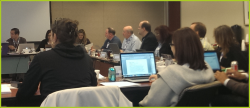Press Releases

The American Cancer Society, the largest non-government, not-for-profit funding source of cancer research in the United States, has approved funding for 110 grants totaling $47,624,000 to researchers and health professionals at 72 institutions nationwide in the first of two grant cycles for 2018. Of the grants, 101 are new while nine are renewals of previous grants. The grants go into effect July 1, 2018.
Two individuals have been awarded the prestigious five-year renewable American Cancer Society Clinical Research Professorship:
Owen A. O'Connor, M.D., Ph.D., Columbia University, New York. While there have been unprecedented improvements in the care of patients with some types of lymphoma, peripheral T-cell lymphomas (PTCL) have yet to benefit from these advances. Dr. O'Connor's lab has invented and/or developed two of the three drugs approved by the FDA that show promising results. The team now seeks to capitalize on this momentum, hoping to move PTCL to the forefront of translational cancer medicine.
Ronald M. Epstein, M.D., University of Rochester, New York, will continue his work on mindfulness in clinical care of patients, including using avatars—human-like figures on screen that can accurately respond to content and emotions and give real-time feedback to improve communication between patients and their health care providers.
One American Cancer Society Clinical Research Professor was renewed for a 5-year term: Stephen J. Meltzer, M.D., Johns Hopkins University, is investigating early diagnosis and cancer development in Barrett’s esophagus, the required precancerous precursor of type of esophageal cancer that is increasing at alarming rates in the United States.
Highlights of the investigator initiated studies approved for funding in the current grant cycle include:
Mo Motamedi, Ph.D., Massachusetts General Hospital, will focus on two major challenges in cancer treatment: resistance to chemotherapy and the recurrence of the disease. His lab will focus on the observation that a small number of non-dividing cancer cells originating from the primary tumor disperse throughout the body and remain in a state of dormancy called quiescence. Dr. Motamedi hopes the work will lead to the identification and eventual development of new therapies against dormant cancer cells.
Lindsey Seldin, Ph.D., Vanderbilt University, will investigate the mechanism(s) regarding how early breast tissue abnormalities lead to ductal carcinoma in situ (DCIS), with the hope of improving breast cancer therapies to stop metastatic breast cancer. Determining the underlying cause of DCIS-associated cell displacement will provide critical insights into how tumor formation begins and could also identify potential protein targets for early breast cancer prevention and/or treatment.
Catherine C. Smith, M.D., University of California, San Francisco, aims to identify genes that lead to resistance to targeted therapies used against the approximately 30% of acute myeloid leukemia (AML) cases with FLT3 mutations. Her team hopes to pinpoint mutations that cause resistance to FLT3 inhibitors in patients and identify strategies to overcome these mechanisms of resistance.
Breelyn Wilky, M.D., University of Miami, will conduct a clinical trial of combination axitinib, a VEGF inhibitor, with pembrolizumab, an immune checkpoint inhibitor, for patients with sarcomas, rare cancers of bone and soft tissue that affect otherwise healthy patients of all ages, including children and young adults. The work may help to identify which patients are most likely to respond to immunotherapy, leading to earlier use of this treatment in cases where chemotherapy is likely to fail, and may inform the next generation of clinical trials of immune checkpoint inhibitors with other combination treatments.
Lyle Fagnan, M.D., Oregon Health and Science University. Although the United States’ Healthy People 2020 goal for completion of the human papilloma virus (HPV) vaccine series by age 13 to 15 years is 80%, only 40% of females and 21% of males currently complete it. Dr. Fagnan will use a rigorous study design to test novel interventions in rural primary care practices and rural community-based organizations intended to increase HPV vaccination completion in both males and females aged 11-17 years.
Courtney E. Sullivan, M.S.N., University of Alabama at Birmingham. Eighty percent of the world's children with cancer live in limited-resource countries where survival averages a dismal 20%. Nurses, who comprise the largest group of health workers globally, are responsible for delivering 90% of patient care. Ms. Sullivan proposes to develop measures of nursing quality and its influence on childhood cancer outcomes across the world. These global indicators will be applicable across varied-resource settings and countries, allowing hospitals to collect information about nursing care and use it to enhance nursing quality and outcomes for children, ultimately contributing to improving childhood cancer survival and outcomes worldwide.
Since 1946, the American Cancer Society has funded research and training of health professionals to investigate the causes, prevention, and early detection of cancer, as well as new treatments, cancer survivorship, and end of life support for patients and their families. In those more than 70 years, the American Cancer Society’s extramural research grants program has devoted more than $4.6 billion to cancer research and is honored to have given funding to 47 investigators who went on to win the Nobel Prize.
The Council for Extramural Research also approved 90 grant applications totaling more than $43.1 million that could not be funded due to budgetary constraints. These “pay-if” applications represent work that passed the Society’s multi-disciplinary review process but are beyond the Society’s current funding resources. They are called “Pay-If” because they can be and often are subsidized by donors who wish to support research that would not otherwise be funded. In 2017, more than $11.5 million in additional funding helped finance 39 “pay-if” applications.
For more information about the American Cancer Society Research Program, please visit http://www.cancer.org/research.